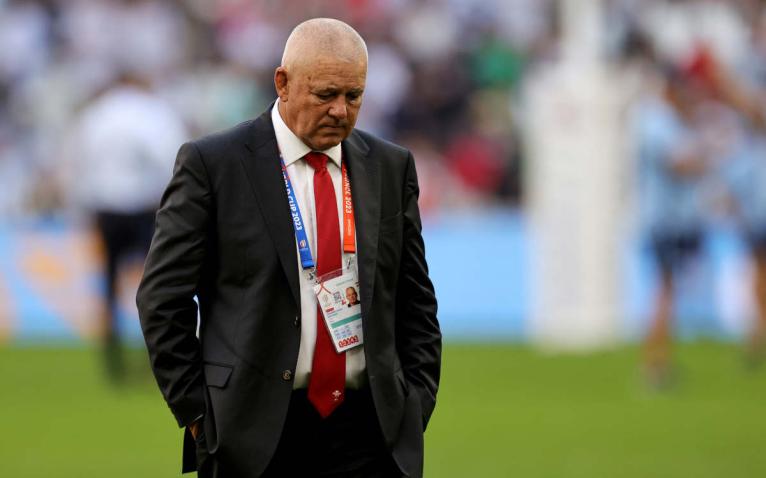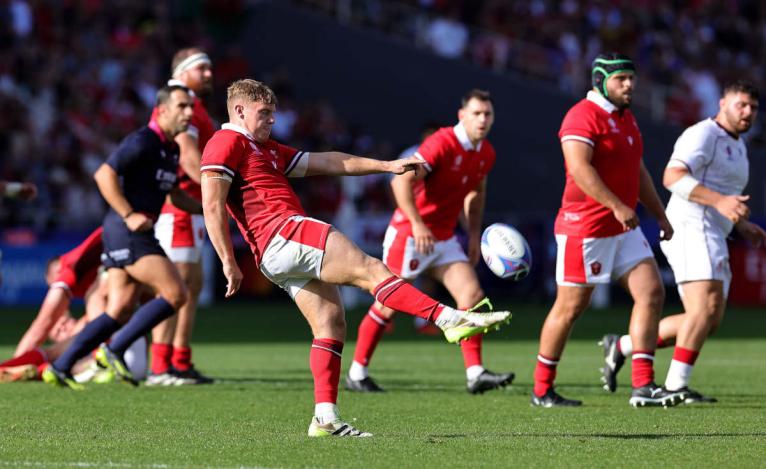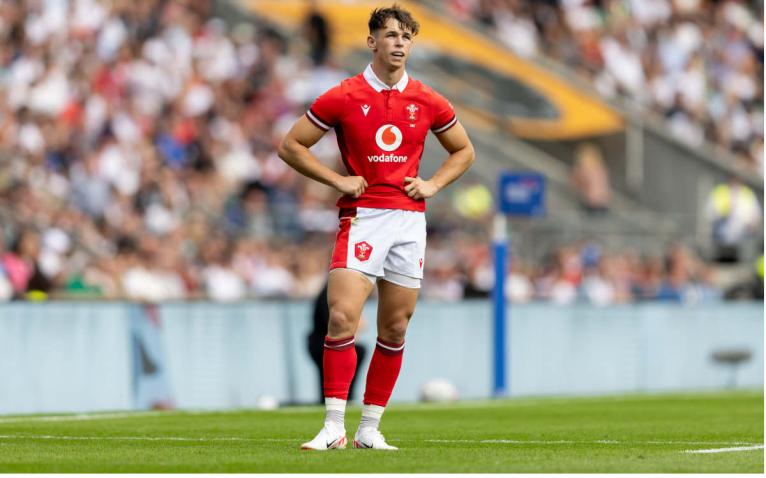Flying home from the 2003 World Cup in Australia, an English passenger sitting near a group of Welsh rugby journalists took time out to make known his opinion that the next decade would be an exciting time for us scribes.
“Wales have an outstanding team in the making,” he said, just days after Wales had given England a hurry-up in a memorable quarter-final in Brisbane.
“They are playing heads-up rugby and have some brilliant young players.
“What I’d give to be doing your job over the next 10 years.”
Welsh rugby being Welsh rugby, it wasn’t all wine and roses. Including caretakers, Wales had six coaches in four years at one point and endured a dreadful 2007 World Cup. There were off-field traumas, among them the still sad tale of Gareth Jenkins leaving the team bus early to avoid the media after his abrupt sacking as team boss and Mike Ruddock exiting his post amid a contract wrangle and contested allegations of player power. During those years, the shower scene in Psycho was arguably more calming than five minutes in Welsh rugby.
But it’s Wales we are talking about. As Harry Lime said in The Third Man: “After all it’s not that awful – in Italy, for 30 years under the Borgias, they had warfare, terror, murder and bloodshed, but they produced Michelangelo, Leonardo da Vinci and the Renaissance. In Switzerland, they had brotherly love, they had 500 years of democracy and peace – and what did they produce? The cuckoo clock.”
Out of the chaos, Wales banked four Six Nations titles in eight years, three of which yielded Grand Slams, and were desperately unlucky not to reach the World Cup final in 2011. The enthusiastic and talkative middle-aged businessman heading out of Sydney all those years ago scored high marks for prescience, then.
What of today?
It seems fair to say optimism is more guarded about Welsh prospects for the years ahead.

The regional game has countless well-documented challenges, not least in relation to funding and the departure of key players. For a few months all has been relatively quiet on that front, but the certainty is the noise will return and the rumours, briefings and counter-briefings will soon be back. The question is a simple one – with such an important link in the Welsh rugby chain arguably weaker than ever, how much more difficult will it be for the national team to thrive?
Warren Gatland is also likely to find a number of long-standing players off limits, with Dan Biggar following Justin Tipuric, Alun Wyn Jones and Rhys Webb into Test retirement amid suggestions that Gareth Anscombe, Liam Williams, Leigh Halfpenny and Dan Lydiate may also have pulled on the red jersey for the final time. At 36, Ken Owens is unlikely to be seen much more on the international field, as well, while the coach plans to sit down with Taulupe Faletau to discuss the No. 8’s playing future after the Cardiff forward recovers from a broken arm.
There is another dark cloud overhead. Wales were whitewashed in the U20 Six Nations last season and haven’t finished in the top half of the table since 2017. Development has taken a hit. France crushed the Welsh juniors 67-17 seven months ago, while Ireland are on a run of five victories in a row in the tournament over Wales and Italy U20s have scored two consecutive Six Nations wins over their Welsh counterparts. Jam tomorrow is in no way assured.
When the dust settles, and despite the likely loss of important personnel, Wales will need to start developing depth, for one of the lessons of their 2023 adventure is that if injuries strike during a tournament there needs to be quality Test-class cover waiting to step in.
Out of all this, the head coach has to plot a way forward. Maybe finding a way out of Hampton Court maze at midnight, while wearing a blindfold, would be easier.
But the coach at least has a degree of momentum after his side defied expectations to reach the last eight in the global tournament in France.
They may have failed to make the most of a favourable draw by reaching the semi-finals, but the campaign was no shocker along the lines of 1991, 1995 and 2007. Postcards were not raced home this time. No coach was sacked in the immediate aftermath. There was no talk of the Welsh team looking like the Mild Bunch, as happened after the tournament in South Africa 28 years ago. Gatland extracted maximum effort from his players. They just weren’t quite good enough to make the last four.
When the dust settles, and despite the likely loss of important personnel, Wales will need to start developing depth, for one of the lessons of their 2023 adventure is that if injuries strike during a tournament there needs to be quality Test-class cover waiting to step in.

In a perfect world, the man in charge would have at least three players in each position capable of starting a major game. For the tournament in France, such riches simply weren’t available to Gatland, with certain individuals not quite ready for big-stage rugby. Maybe the players in question will be up to speed in four years’ time, maybe they won’t be. It will fall to the head coach to make the calls.
Certainly, Gatland was unlucky to see his frontline fly-half, a true warrior in Biggar, sustain a number of knocks during the tournament, while Anscombe’s ill fortune on the fitness front continued. It meant an enhanced role for Sam Costelow. The Scarlet showed in the opening half against England in Cardiff in the summer that he has potential, and he is in position to head for the Six Nations as Wales’ first-choice No. 10, with Anscombe bound for Japan after Biggar’s decision to head off into the sunset.
“We’re excited about Sam and feel he’s going to be a little bit special going forward,” said the head coach after the quarter-final loss against Argentina. Some Gatland watchers felt the comment may have been the New Zealander’s way of lifting the spirits of a young player who had just seen a pass picked off for an opposition interception try.
But let’s assume he truly believes that the lad from Pencoed is destined for a big future. All who walk on the sunny side of the street will hope events prove him right. Just maybe, though, Costelow will need time, and with the 2024 Six Nations barely three months away, it is asking a lot of the youngster to take a major leap forward between now and then.
Gatland may be interested in the young Dragons’ tyro Will Reed, a likely lad who has the ability to operate flat to the line and spark those outside him. Playing alongside a craftsman in Matt O’Brien for Newport RFC has helped him hugely and he has developed the tactical side of his game.
Alternatives? Owen Williams at the Ospreys, Callum Sheedy at Bristol and, er … if there’s anyone else out there qualified and ready to play fly-half for Wales could he please make himself known in reception.
That isn’t to say there are zero other fine Welsh No. 10s.
Jarrod Evans is one. He may not have the boot of a Gavin Henson or a Tony Clement, but Harlequins’ freshly acquired playmaker can bewilder opponents with a shimmy, a jink, a sidestep or a deft kick. He has something that not every modern fly-half has – an imagination. The problem is the eight-cap back is out of Gatland’s reach because of the rule that stops exiled players from representing Wales unless they have already played in 25 or more Tests. The same regulation also captures Sam Davies after his move to France in the summer.
Such is life. Further down the line Gatland may be interested in the young Dragons’ tyro Will Reed, a likely lad who has the ability to operate flat to the line and spark those outside him. Playing alongside a craftsman in Matt O’Brien for Newport RFC has helped him hugely and he has developed the tactical side of his game. Ospreys’ Dan Edwards, similarly, has a wide repertoire of skills and is seen as a player who could come through. Those two are players for the future.
At full-back there is a school of thought that Wales are in Old Mother Hubbard territory after Williams and Halfpenny.

Gatland used Louis Rees-Zammit at the back late on in the matches with Georgia and Argentina, but it’s unclear if the coach sees the flyer as a long-term option at No. 15.
Works in progress include the talented Cardiff youngsters Jacob Beetham and Cameron Winnett, while Tom Rogers is brave, quick and sinewy in the Williams mould. If Wales want a bit of maturity in the role, they could do worse than take a look at Angus O’Brien, a player the coaches have had a blindspot over for too long, with the Dragons’ back able to hoof the ball long distances and beat defenders with his running. The east Wales region also have on their books Cai Evans, who can kick a ball further than some people go for their holidays. Expect uncertainty aplenty at No. 15 this term, then, but the situation should improve.
Sticking with the back three, can the cross-coder Regan Grace be added to the mix once he recovers from long-term injury? His performances in rugby league offer hope for cautious optimism. Then there’s Immanuel Feyi-Waboso, who now plays for Exeter Chiefs. He is young and still putting miles on the clock, but there are probably extra terrestrials who’d be able to discern that the 20-year-old has promise.
What of the forwards? Perhaps the key here is not to write off anyone too quickly. The likes of Gareth Thomas, Nicky Smith, Tomas Francis, Will Rowlands and Taulupe Faletau all theoretically have a few years of Test rugby in them. There should be no rush to hasten anyone’s retirement.
Francis’s worth is as a tighthead who can scrummage, a quality that matters hugely unless the world has changed while this writer was putting the kettle on. Market-leaders such as New Zealand, South Africa, Ireland and France all have strong scrum anchors. Francis may not be quite at the level of Tyrel Lomax, Frans Malherbe, Tadhg Furlong and Uini Atonio, but he is the best Wales have and they need him to continue.
If Morgan Morse develops fully, he could go all the way – Wales, even the British and Irish Lions. I just like the way he put his heart and soul into every single thing.
Patrick Horgan, former Wales U20s coach
Dewi Lake heads a healthy stock of hookers and in the second row Daf Jenkins is emerging while Rowlands could still be around in a group set to contain Adam Beard with Christ Tshiunza, Rhys Davies, Teddy Williams, Seb Davies and Ben Carter there or thereabouts.
Further back the Wales coaches will look at Duane Vermeulen delivering for South Africa at 37 and hope Faletau can similarly rage against the dying of the light. In the meantime, the development of players such as Carwyn Tuipulotu and the big ball-carrying Mackenzie Martin needs to happen. And Morgan Morris was not named young player of the year in Wales last season for nothing. Multi-skilled and lethal close to the opposition line, he should be looked at as well. So should Ross Moriarty, again.
On the flanks, further depth could eventually be provided by Taine Plumtree, Harri Deaves and Morgan Morse, with the latter an exceptional prospect. Rewind to Wales U20s’ hiding by France back in March, when the 18-year-old could be seen chasing 80 metres in pursuit of a kick upfield with the clock deep into the red and his side 50 points adrift.
“There’s a certain attitude to playing rugby. Morgan Morse was showing it and has a big future,” the former Wales U20s coach Patrick Horgan said later. “If he develops fully, he could go all the way – Wales, even the British and Irish Lions. I just like the way he put his heart and soul into every single thing. Chasing after kicks in the 83rd minute is nothing to do with rugby structures. It’s down to the individual.”

Horgan knows what he is talking about, having coached the likes of Sam Warburton, Justin Tipuric, Leigh Halfpenny, Dan Biggar and Jonathan Davies at an U20 World Cup back in the day. Individual responsibility is important.
But, of course, having the right structures and investment in place helps, as well.
“We are a small country. To stand a chance of succeeding, we have to do every single thing right in terms of our structures and preparation.”
Mark Taylor, ex-Wales international
For Wales, then, nothing is guaranteed in the months and years ahead. New leadership in the Welsh Rugby Union should help, but players need time to develop and it won’t be easy to fill the gaps left by those who are finishing. The governing body also has to avoid any missteps, and quality coaching and player development should be prioritised.
“We are a small country,” the ex-Wales and Lions centre Mark Taylor once said. “To stand a chance of succeeding, we have to do every single thing right in terms of our structures and preparation.”
His words were true when he spoke them a couple of decades or so ago, and they are true now.
Welsh rugby has much to do for the national team to prosper in Australia in 2027.


Comments
Join free and tell us what you really think!
Sign up for free